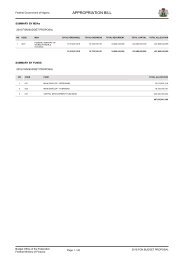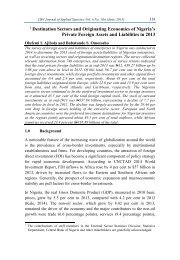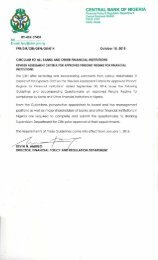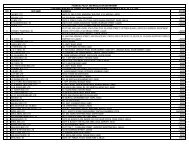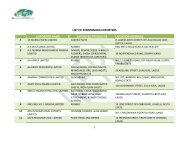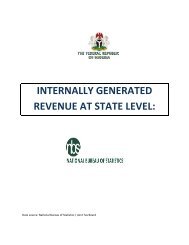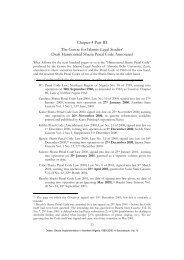CONTENTS
Delta-State-Bond-Shelf-Prospectus
Delta-State-Bond-Shelf-Prospectus
- No tags were found...
You also want an ePaper? Increase the reach of your titles
YUMPU automatically turns print PDFs into web optimized ePapers that Google loves.
RISK AND MITIGATING FACTORS FOR THE PROGRAMMEThere is a degree of risk involved when investing in securities. Prospective investors should therefore carefully consider the risks described belowas well as the detailed information set out elsewhere in this Prospectus before making a decision regarding a purchase of the Bonds. Any of thefollowing risks could result in a material adverse effect on the State’s financial condition, results of operations and ability to the Bonds. Therisks may also have a material adverse effect on the revenue, costs and other estimates and assumptions underlying the financial projectionsshown in this Prospectus, causing actual operating results to be materially lower than those indicated in the financial projections. The risksdescribed below are not the only risks facing either the securities or the Issuer. Additional risks and uncertainties not presently known to theIssuer or that the Issuer currently considers immaterial may also materially and adversely affect the securities. Investors should reach their ownviews or obtain such professional advice as they deem appropriate, before making a decision in respect of the Bonds.Macroeconomic risks1. Inflation risk: There is a risk that the rate of price increases in the economy deteriorates the returnsassociated with the Bond. Fixed rate bonds are most susceptible to this due to coupon being fixed atinception based upon expectations of the inflation rate. Inflation erodes the purchasing power of thecurrency thereby diminishing the real income of the bondholder.Mitigating Factors: A central role of the Central Bank of Nigeria, like its counterparts in othercountries, is containment of inflation. The CBN has adopted an inflation targeting framework. It isexpected that this method will keep inflation at a level that is in line with the assumptions built intothe coupon rate attached to this bond.2. Interest rate risk: There is an inverse relationship between bond prices and interest rates, thus, thereis a risk that bond prices will fall as interest rates rise. By buying a bond, the bondholder hascommitted to receiving a fixed rate of return for a fixed period. Should the market interest rate risefrom the date of the bond's purchase, the bond's price will fall accordingly. The bond will then betrading at a discount to reflect the lower return that an investor will make on the Bond.Mitigating Factors: Investors who hold their bonds to maturity will not be exposed to this risk asthe state government will redeem the bonds at par. Investors who dispose their bonds may beexposed to a variation in the principal amount received due to these fluctuations. However, marketinterest rates are a function of several factors such as the demand for, and supply of, money in theeconomy, the inflation rate, the stage of the business cycle as well as the government's monetary andfiscal policies. The CBN has successfully maintained a stable interest rate regime over the past decade.It is expected that this policy will be maintained thereby mitigating this risk.3. A decline in the price of crude oil: The sale of crude oil provides a significant proportion of theFGN’s earnings. Crude oil prices are volatile due to business cycle and the concentration of suppliesin regions that are politically explosive. The booms & busts experienced in the oil industry haveusually hit Nigeria hard because of the country’s mono-product economy. A decline in the price ofcrude oil will reduce the funds available for distribution via the FAAC account. The State, like most ofthe other Nigerian States is heavily reliant on the FAAC account, as its main source of revenue, andwill experience a drop in revenue with a decline in the price of crude oil.56




